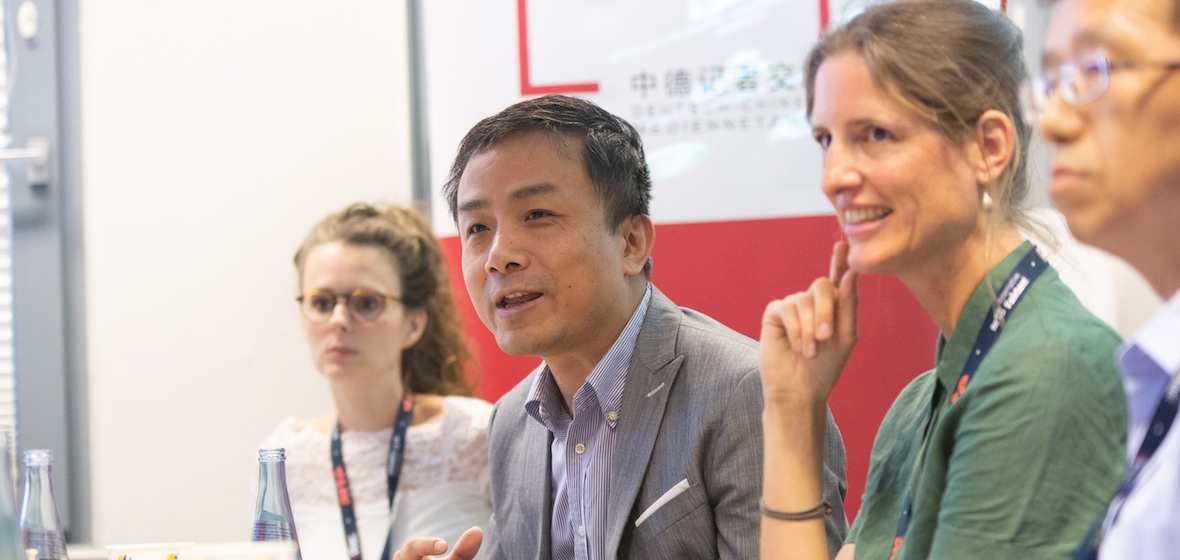Matthias Naß: New Chinese Leadership, New Foreign Policy?
03.05.2013
In October 2011, I was invited by China’s television network CCTV to a conference in Beijing. The title of the conference was „Connect China with the World“. The goal of the conference was to discuss ideas how CCTV could better compete with international TV networks such as CNN, BBC, or Al Jazeera and become more effectively China’s voice in the world.
This conference was part of an effort to pay more attention to China’s soft power. The reason for this is obvious. China’s economic rise of the last almost 35 years has been spectacular. This rise has far reaching consequences, not only economically, but politically, too. China is a country that is admired for its success; but it is also feared for its growing power, especially by its neighboring countries. People respect China; but do they like it?
A 2010 BBC poll of twenty-eight countries showed a positive image of China only in Pakistan and in Africa, whereas in Asia, the Americas, and in Europe the opinion was mixed or poor (Joseph Nye, „The Future of Power“, p. 89). Another poll taken in 2009 by the Chicago Council on Global Affairs found China’s soft power less than that of the United States and concluded that „China’s charm offensive has thus far been ineffective“ (ebd.). China, concludes David Shambaugh, professor at George Washington University, in his new book „China Goes Global“, possesses „little soft power and is not a model for other nations to emulate“.
Lee Kuan Yew, the former prime minister of Singapore, says China will never be able to compete with the United States in terms of soft power simply because its language is extremely difficult to learn for Westerners. That might be true or not. It seems clear to me that China has a long way to go to improve its image.
Xi Jinping, China’s new president, since taking office has been emphasizing the „Chinese Dream“ as the catchphrase of the new leadership – the dream of the renaissance or the rebirth of the Chinese nation. What Xi is referring to is not only the blossoming of the Chinese culture, but also China’s place among the nations. The „Chinese Dream“ – that seems to imply a strong state, and of course this has implications for China’s relations with the rest of the world.
As a result of China’s rise we have seen the centre of gravity in world politics shift to Asia. This shift will define the geopolitics of the 21st century. As the British historian Neill Ferguson said, what we are witnessing today is the „end of 500 years of Western pre-dominance“.
We all know that the rise of China is in fact the return of a nation that, as Henry Kissinger likes to point out, had for 1,800 of the last 2,000 years the largest GDP in the world. In other words, China’s new pre-eminence is historically a return to normality; the anormality was the dominance of the West during the last two centuries.
At the beginning of the 21st century we are witnessing a growing super-power competition between China and the United States. It is an economic and a political competition, not an ideologically one, and not an arms race. At least not yet. But, as the Financial Times once wrote: „The defining drama of the next century will be the battle for power and influence between China and America.“
The fact that China’s new president Xi Jinping chose to travel to Moscow on his first state visit, not to Washington, and then on to the summit of the BRICS countries in South Africa doesn’t mean that Russia is more important for him than the United States. For Xi Jinping the priorities remain the same as for his predecessor Hu Jintao, who by the way also chose Russia for his first trip abroad. I would expect, though, that Xi Jinping, in his dealing with America, acts even more assertive. His position at home seems to me to be stronger, especially his relationship with the armed forces is much closer than that of Hu Jintao.
Hu Jintao had to wait two years before his predecessor, Jiang Zemin, handed him the chairmanship of the Central Military Commission. Xi became chairman right away, together with becoming head of the party. That is important because „the Chinese military owes its paramount loyalty to the party and its leader, not to the civilian government“ (Chris Buckley, „New Chinese Leader Shores Up Military Support“, New York Times, March 3, 2013).
The signs for a growing competition between China and the US are abundant. US president Barack Obama has made the „pivot to Asia“ the cornerstone of his foreign policy. By strengthening old alliances with Japan, South Korea or Australia and by paying more attention to new relationships with countries like Vietnam, the United States don’t even try to hide the fact that its Asia policy is focused on China. And it does not come as a surprise that China feels encircled by the United States.
China considers the tensions in the South China and the East China Sea as strictly bilateral problems. But the United States argue that its national security interests are at stake, too, since America has been a Pacific power for a long time as well.
Most Asian countries look at the United States as a balancing power. But they urge the US to avoid an open confrontation with China. They do not want to get into a situation where they have to choose between China and America.
There is a new nationalism in China that, combined with its economic strength, creates uneasiness among the neighbouring countries. We have witnessed this nationalism in China’s conflict with Japan over the Senkaku/Diaoyu Islands as well as in the confrontation over islands in the South China Sea.
The change in the leadership in Beijing, as far as I can see, has not diminished a certain perception gap between the West and China. Western governments, the Chinese say, measure China by their own standards, e.g. when it comes to human rights. The Chinese seem to think this is part of a Western plot, an attempt to prevent China from growing.
Perhaps there is more to this than a perception gap. Perhaps there are real differences of interests and different expectations towards each other.
Now that China has become so much stronger the West expects China to take up more responsibilities in world politics – in the words of former World Bank president Bob Zoellick: to become „a responsible international stakeholder“.
The West wants China to play a stronger and more constructive role in such conflicts as North Korea’s and Iran’s nuclear programs or in the Syrian civil war.
But China is reluctant to shoulder these responsibilities. The leadership argues that its main contribution to world peace and stability is the country’s own economic development and that it is not yet ready to play a more active role in international affairs.
„While the outsiders often see China as a rising giant and a threat, Chinese leaders are in fact largely nervous and insecure, uncertain how to manage, both at home and abroad, the inevitable tensions that arise from their nation’s rapid ascent on the world stage“, Zheng Wang, an associate professor of international relations at Seton Hall University recently wrote in the New York Times.
One thing seems to be clear: China does not want to take over from the United States as a superpower with global reach. As David Shambaugh wrote: „China has become truly a global actor – but is only a partial global power.“
And Shambaugh concludes in his new book: Chinese diplomacy „is not influential in many parts of the world or on major international issues. China is not shaping events and actively contributing to solving problems. Rather, it is quite risk-averse and narrowly self-interested.“
To quote Shambaugh one more time: „I conclude that China ‚punches way below its weight’ in international diplomacy. Beijing is not doing enough to shoulder its appropriate share of international responsibility and to be a world leader.“
But that is what the world actually needs and what it expects from China.
North Korea might be a good example that China under the new leadership in Beijing, reluctantly, is willing to play a somewhat more responsible role. China has supported the resolutions of the UN Security Council imposing severe sanctions on North Korea. And Xi Jinping sternly warned the government in Pyongyang not to create „chaos“ near the Chinese border. These are encouraging signs!
China’s change of leadership has been going far beyond the top leadership. In fact, about 70 percent ot the leading positions in the governent and the party have changed since last fall. One of those who retired was State Councilor Dai Bingguo who has been called Beijing’s „foreign policy czar“. His successor is Yang Jiechi, the former Foreign Minister. But Yang was never considered to be as influential as Dai Bingguo.
So I asked a Western diplomat who would be the person having the strongest impact on China’s foreign policy in the future. And he gave me only one name: Xi Jinping.
In other words, China’s foreign policy could be shaped more than before at the very top of the party and the state. The substance of China’s foreign policy might be the same, but the style might differ. That style could be more direct, more to the point. And personalities matter in diplomacy, even if the fundamental interests of the state remain the same. Barack Obama might soon find out.
3rd May 2013
 Matthias NASS is International Correspondent of Die Zeit. He was its deputy editor-in-chief from 1998 to 2010. His focus is foreign policy, with a particular interest in human rights. Research trips regularly take him to East Asia. Naß studied history, sinology and politics in Göttingen, Honolulu and Hamburg.
Matthias NASS is International Correspondent of Die Zeit. He was its deputy editor-in-chief from 1998 to 2010. His focus is foreign policy, with a particular interest in human rights. Research trips regularly take him to East Asia. Naß studied history, sinology and politics in Göttingen, Honolulu and Hamburg.
